As climate change and biodiversity loss escalate, we must look beyond policy and infrastructure for solutions. “Rewilding,” a concept rooted in ecological restoration, offers a powerful approach. But it’s more than restoring landscapes; it’s about reconnecting with nature, reigniting a sense of wonder and amplifying diverse voices.
The new Rewilding exhibition at the Canadian Museum of Nature, opening this week, showcases how art can drive this rewilding process. Featuring winners of the David Suzuki Foundation’s inaugural Rewilding Arts Prize, the exhibition challenges us to reimagine our relationship with the natural world.
The Rewilding Arts Prize
The David Suzuki Foundation and Rewilding Magazine launched the inaugural Rewilding Arts Prize in 2022-23. From hundreds of artists throughout the country, 13 winners were selected by a prestigious jury. The winners were featured in Rewilding Magazine and are now being showcased at the first-ever rewilding-themed exhibition at a major museum in Canada.
In partnership with the David Suzuki Foundation, the Canadian Museum of Nature is hosting the Rewilding exhibition from October 2024 to September 2025, featuring all the winners of the inaugural Arts Prize. The exhibition and year-long programming demonstrate the transformative power of art, showcasing the concept of rewilding through diverse and innovative artistic practices from Rewilding Arts Prize winners.
The Exhibition
Explore the Rewilding exhibition at the Canadian Museum of Nature
Step into a captivating realm where art and nature seamlessly merge. Thirteen Canadian artists bring the concept of rewilding to life, highlighting through their compelling works of art the vital role nature plays in our communities. Selected by a distinguished jury of Canadian artists, this exhibition features the remarkable creations of winners of the inaugural David Suzuki Foundation’s Rewilding Arts Prize.
Reimagining our connection to nature through art
These visionary artists offer fresh perspectives on rewilding in our backyards, neighbourhoods, and communities. Their works reimagine our relationship with nature and biodiversity, inviting us to reconnect with the natural world in new and meaningful ways. Don’t miss this extraordinary opportunity to experience how art can transform our understanding of the environment.
Understanding rewilding
Rewilding is about restoring and revitalizing natural ecosystems, allowing them to return to their original, self-sustaining states. The goal is to enhance biodiversity, strengthen ecosystems and create resilient landscapes that can thrive.
Celebrating the David Suzuki Foundation’s Rewilding Arts Prize
The Rewilding Arts Prize honours artists who use their creativity to highlight the importance of rewilding in our lives and communities. Learn more in the section below about the prize and the talented artists who have been recognized.
About the curator
Helen Gregory is an accomplished artist and curator based in London, Ontario. She holds a PhD in art and visual culture from Western University and serves as the curator of McIntosh Gallery. Her work explores the intersection of art, science and museology, with a particular focus on the role of natural history in contemporary art.
Engage further with educational programs
Deepen your understanding of rewilding through the museum’s educational programs, which include rewilding workshops inspired by the artists and their works. These hands-on activities allow you to create your own art and explore nature from a fresh perspective, encouraging you to engage with the concept of rewilding in your own surroundings.
Winners
The Rewilding Arts Prize
Art can be a powerful tool to educate, advocate and inspire. We need the ingenuity and creativity of artists more than ever to help meet the profound challenges we face with the climate and biodiversity crises. The Rewilding Arts Prize was launched in 2022 to celebrate artists using artistic means to creatively visualize and bring attention to issues of rewilding in our lives and communities.
The Rewilding Arts Prize was presented by the David Suzuki Foundation and Rewilding Magazine. The competition was open to artists and groups in Canada. From more than 550 artists who applied, our esteemed jury selected 13 winners.
2022-23 Rewilding Arts Prize winners [in alphabetical order]:
- Khadija Baker
- Anna Binta Diallo
- Laara Cerman
- Kendra Fanconi
- Natasha Lavdovsky
- Hashveenah Manoharan
- Angela Marsh
- Amanda McCavour
- Sarah Peebles
- Amber Sandy
- Cole Swanson
- Justin Tyler Tate
- Janice Wright Cheney
Rewilding Arts Prize recipients were chosen by a jury of artists, including visual artist, author and advocate Christi Belcourt; printmaker and visual artist Edward Fu-Chen Juan; visual artist and educator Charmaine Lurch; visual journalist and author Sarah Lazarovic and multidisciplinary street artist Nick Sweetman.
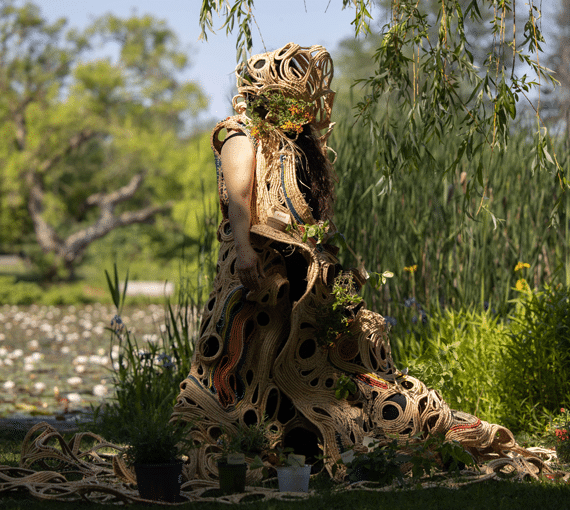
KHADIJA BAKER
- Multidisciplinary artist from Saint-Leonard, Quebec
- Combines textiles, sculpture, performance, sound and video
- Created “Performing community garden” installation with handmade paper and plants
- Instagram: @bakerkhadija
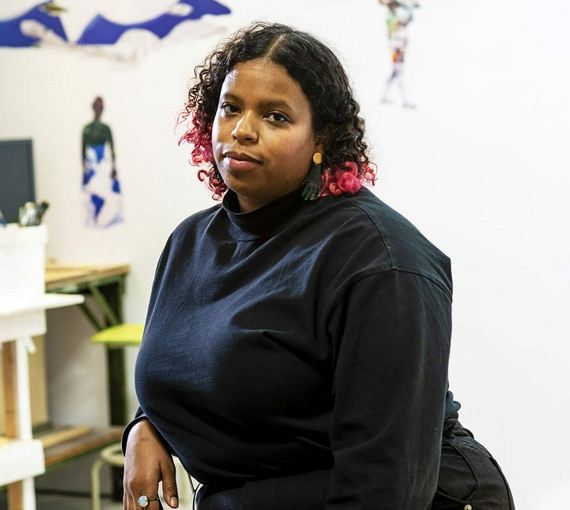
Anna Binta Diallo
- Winnipeg-based interdisciplinary visual artist reimagines the idea of “‘wilderness”’ across cultures, blending human, geometric, scientific, and ecological elements into a thought-provoking visual narrative.
- Uses large-scale collage to examine our instinct to dominate nature as a means of survival.
- Instagram: @annabintadiallo
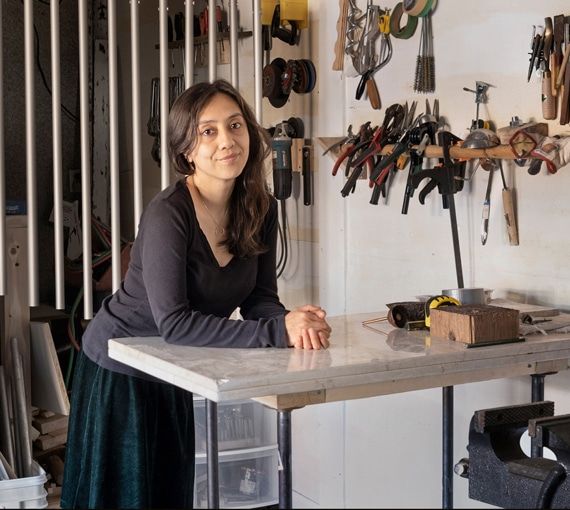
Laara Cerman
- Vancouver artist makes a powerful plea to protect ancient forests.
- Creates a powerful reminder and raises haunting questions of what’s at stake if old growth trees continue to be destroyed.
- Instagram: @laaracerman
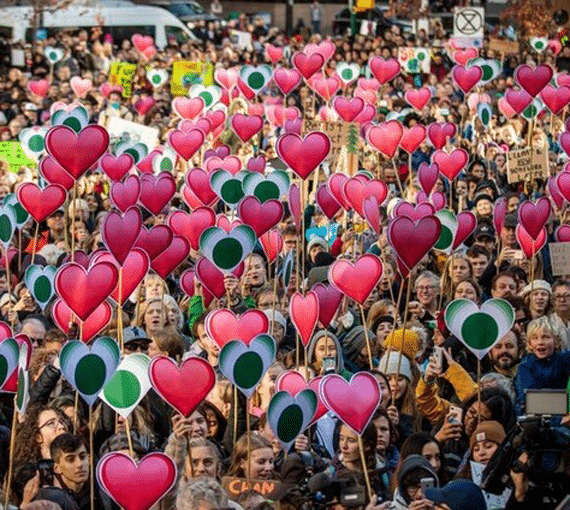
KENDRA FANCONI
- Former artistic director of The Only Animal, a theatre company that brings arts and artists to the front lines of the climate emergency
- Creates immersive work that arises from a deep engagement with place and theatrical adventurism that seeks to re/connect human nature with nature
- Instagram: @fanconikendra
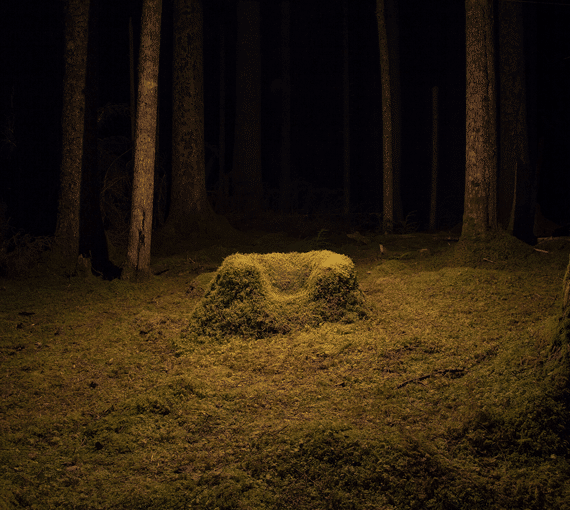
NATASHA LAVDOVSKY
- Vancouver Island-based artist, amateur lichenologist and naturalist
- Uses ephemeral, salvaged, scavenged and invasive natural materials to highlight interconnections to the ecologies that support domestic life, while questioning the human-nature dualism that is at the basis of colonial culture
- Over four years created a moss-covered armchair in a remote coastal rainforest
- Instagram: @virtual.tasha
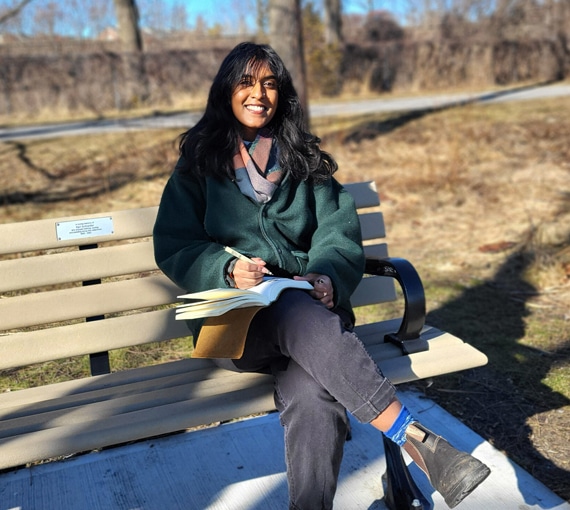
Hashveenah Manoharan
- Tamil-Canadian artist, ecologist, and arborist, uses her artwork to deepen her relationship with the natural world.
- Through her watercolours, celebrates the hidden beauty of nature and the intersection of cultural eco-identities.
- Instagram: @hashveenah
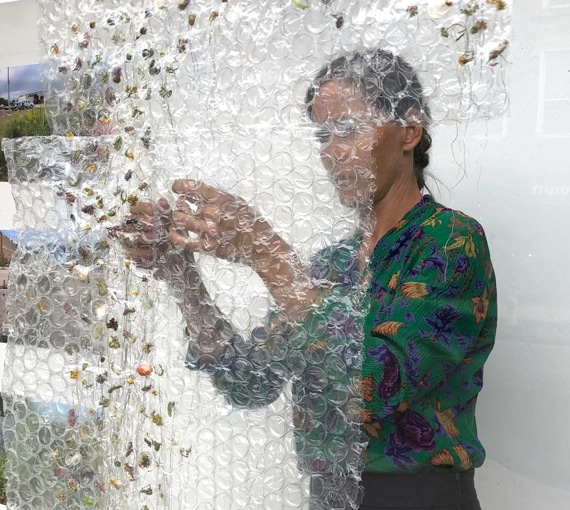
Angela Marsh
- Quebec artist uses tapestry from salvaged materials and fragments of wild plants to transform abandoned urban spaces into symbols of resilience.
- Challenges us to reimagine urban spaces as vital ecosystems rather than wastelands.
- Instagram: @angelamarsh33
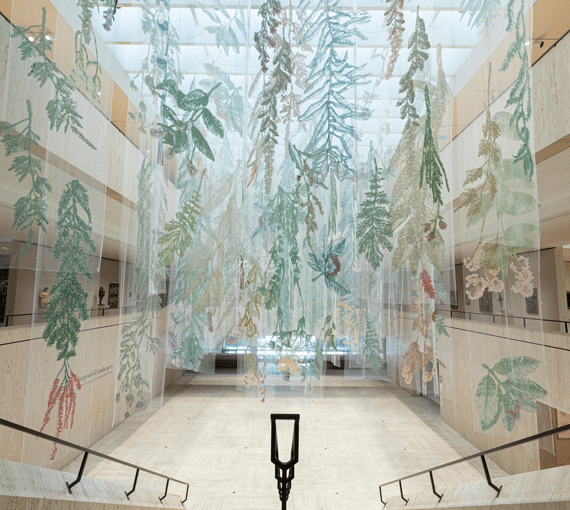
AMANDA McCAVOUR
- Toronto-based textile artist creates large-scale, immersive embroidered installations
- Interested in finding connections between scientific research, ecology and decorative patterns
- Instagram: @amandamccavour
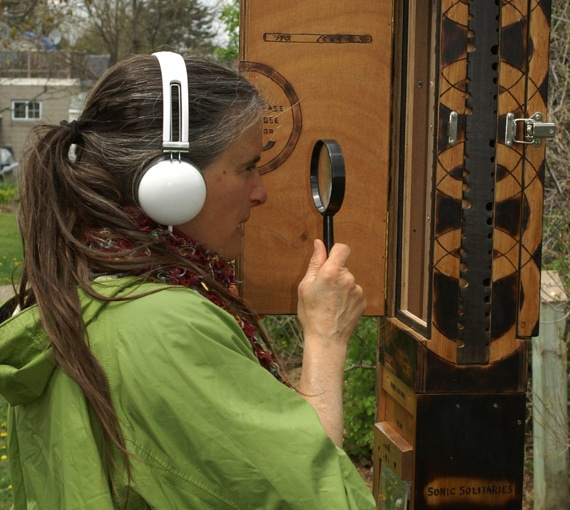
Sarah Peebles
- Toronto-based artist and soundscape composer brings the unseen world of native bees and wasps to life in her multi-sensory installations.
- Through amplified sound and close-up footage, she immerses visitors in the intimate and often overlooked world of solitary pollinators, emphasizing their critical role in maintaining healthy ecosystems.
- Website: Resonating Bodies
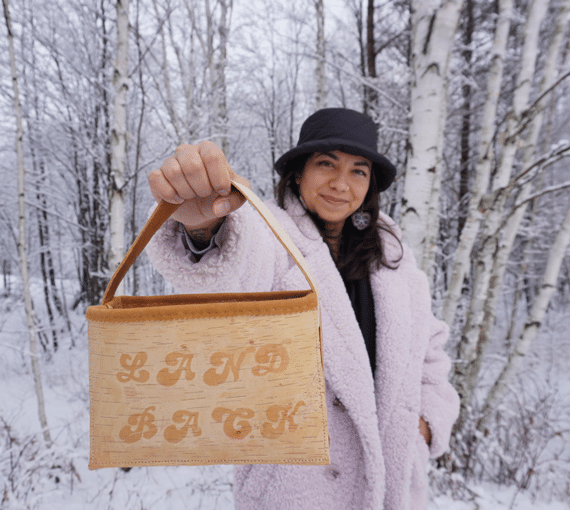
AMBER SANDY
- Anishinaabe artist, hide tanner, harvester and natural scientist
- Art practice focuses on using natural elements from the land to reclaim traditional knowledge that was lost over generations because of colonialism, and to continue honouring relations with non-human kin
- Created a purse using birch bark and home-tanned moose and deer hide
- Instagram: @ambsandy
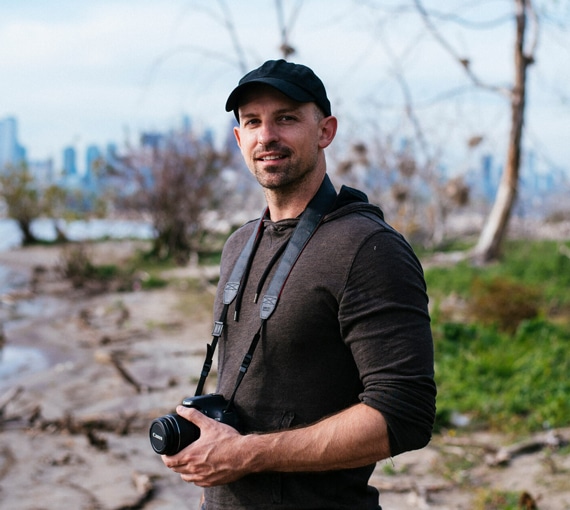
Cole Swanson
- Toronto-based artist collects and gilds insects from everyday life, creating installations that explore human-insect kinship.
- Offers a meditation on life, death, and our deep planetary interconnectedness.
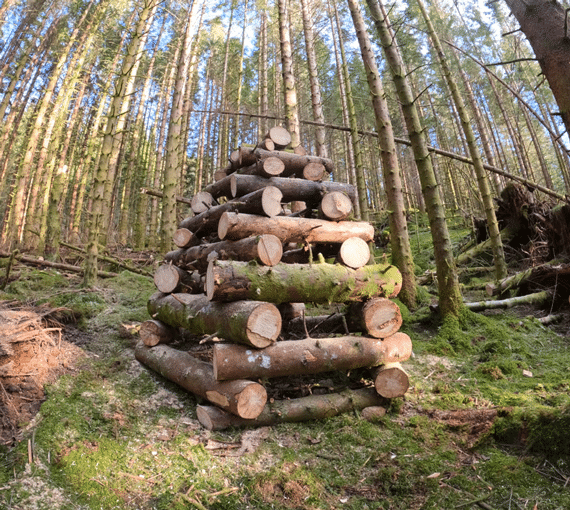
JUSTIN TYLER TATE
- Artist, architect brut, labourer, author and curator
- Creates “Post-Anthropocene Architecture” structures focused on creating co-habitative spaces for interspecies dialogue and collaboration
- Instagram: @Justin_Tyler_Tate
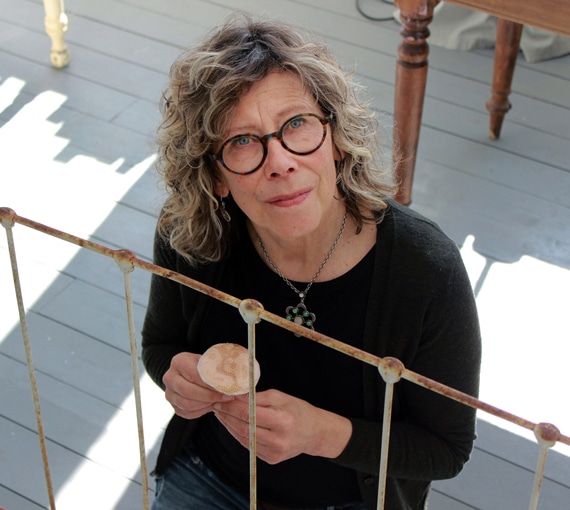
Janice Wright Cheney
- Fredericton-based artist challenges us to reflect on the lives of animals held in captivity for human entertainment.
- Gives voice to those animals whose stories have long been ignored.
- Instagram: @jwrightcheney
Rewilding Arts Prize jury
Christi Belcourt
Christi Belcourt (apihtâwikosisâniskwêw / mânitow sâkahikanihk) is a visual artist, designer, community organizer, environmentalist, social justice advocate and avid land-based arts and language learner. Like generations of Indigenous artists before her, she celebrates the beauty of the natural world and traditional Indigenous world views on spirituality and natural medicines while exploring nature’s symbolic properties. To learn more about Christi Belcourt’s visual arts practice and activism, please follow her on Facebook @ChristiBelcourt, Twitter @christibelcourt or Instagram @christi_belcourt.
Edward Fu-Chen Juan
Edward Fu-Chen Juan is a contemporary visual artist based in Vancouver, B.C., the unceded territories of the xʷməθkʷəy̓əm (Musqueam), Sḵwx̱wú7mesh (Squamish) and Sel̓íl̓witulh (Tsleil-Waututh) Nations. He identifies as a queer Taiwanese Canadian with ethnic roots from the Hakka and the Plains First Nation People of Taiwan. His art practice is printmaking on paper with water-based ink extracted from plant and insect ingredients. Presently, he has expanded his process to papermaking with unconventional plant fibres of significant cultural importance. You can follow his journey on Instagram @edjuandraws and his blog www.edjuan.com.
Charmaine Lurch
Charmaine Lurch is an interdisciplinary visual artist whose work draws attention to human-environmental relationships. Lurch’s paintings and sculptures are conversations on infrastructures and the spaces and places we inhabit. Working with a range of materials and reimagining our surroundings — from bees and taxi cabs to The Tempest and quiet moments of joy — Lurch subtly connects Black life and movement globally. Follow Charmaine on Instagram @charmaine.lurch and her website clurch.com.
Sarah Lazarovic
Sarah Lazarovic is a climate artist, writer and communicator. She writes the not depressing climate newsletter Minimum Viable Planet, is head of communications for Rewiring America and co-created Talk Climate to Me, a climate education program that has trained more than 1,300 women. Follow Sarah on Instagram @sarahlazarovic and Twitter @sarahlazarovic.
Nick Sweetman
Nick Sweetman is a multidisciplinary artist from Toronto whose practice has explored painting and its intersection with photography, video, installation, mixed media and urban intervention. He has been working in public spaces on mural projects in partnership with various artists and non-profit organizations, including the David Suzuki Foundation. He has dedicated many projects to raising awareness about the importance of pollinators, painting giant bees towering over busy city streets and filling laneways with butterfly-themed murals. Follow Nick on Instagram @nick_sweetman and Twitter @nsweetman.
Rewilding Arts Prize FAQ
-
A: “Rewilding” is a term first used widely in the 1990s. It usually applies to efforts to restore ecological function and natural processes to an area. For the purposes of this prize, we are applying the term “rewilding” to the human-dominated landscapes we call home: our yards, neighbourhoods and communities. How do we rewild a neighbourhood or bring nature home to a community? We have a few ideas, but we’re also excited to showcase interpretations of this theme from artists throughout the country.
-
A: The David Suzuki Foundation ran the Rewilding Arts Prize in 2022-23 as a pilot project. Winners were announced in February 2023. Read our media release here. We hope to offer the prize again. Stay tuned by subscribing to the David Suzuki Foundation email newsletter and following us on social media.